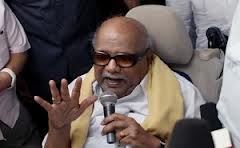
Chennai, November 14: Continuing the suspense over its stand on any Opposition-sponsored resolution in Parliament against FDI in retail, crucial UPA ally DMK on Wednesday said its decision would be taken keeping in mind the interest of small and medium traders.
"Small and medium retail traders in Tamil Nadu are apprehensive that Foreign Direct Investment would greatly affect them. We would discuss and take a decision on this (FDI) keeping their interest in mind," DMK president M Karunanidhi told reporters here.
To persistent queries on why DMK was maintaining a suspense on its stand over the FDI issue and whether it would support a no-confidence motion against the UPA government, Karunanidhi, also a well-known screenplay writer, said: "I have written the script for more than 100 films. A film would be successful only if it has suspense."
When asked whether DMK would support Left parties and some other parties' proposed resolution with provision for voting in Parliament on FDI, he said the party's views would be made known after consultations with DMK Parliamentary Party members.
Karunanidhi had yesterday said DMK's stand on FDI in retail would be known when a Bill on it was brought before Parliament during the winter session beginning on November 22.
In case of voting, the support of DMK, the second largest UPA ally with 18 Lok Sabha MPs after the exit of Trinamool Congress, is crucial for the UPA.
DMK has opposed the Centre's decision to allow FDI in multi-brand retail sector and had even supported the nation-wide bandh called by various parties in September.
Karunanidhi had then said his party would support if the Opposition moved a resolution in Parliament against FDI in retail.
While Trinamool Congress chief Mamata Banerjee has threatened a no-confidence motion, the Left parties have decided to move motions under voting rules in both Houses of Parliament to reject government's decision on the issue.
BJP to oppose govt on FDI in retail
Refusing to give up on the FDI in multi-brand retail issue which could affect its core vote bank of small traders, BJP on Wednesday said it will oppose the government decision in Parliament and try to build a joint strategy with NDA partners and other political parties.
"BJP will strongly oppose the government decision on FDI in multi-brand retail in the forthcoming winter session of Parliament. This decision is not in the interest of the country," party chief spokesperson Ravi Shankar Prasad said.
He announced that BJP will discuss its strategy with other NDA partners and also get in touch with political parties which have reservations on the issue.
The NDA allies are likely to hold a meeting on November 21, a day before the winter session begins.
"We would like to put the government on the mat on this issue. In November 2011, the then finance minister had announced in the Lok Sabha that a decision on FDI in multi-brand retail will be taken only after consulting all concerned sections. A similar statement was made by the then commerce minister in the Rajya Sabha," Prasad said.
BJP charged that this promise has been violated by the government as it has taken the decision unilaterally.
But the principal opposition is not yet clear to what extent it will go against the government in Parliament.
Though the opposition claims to have support of majority of MPs in both Houses on the issue, the NDA is unlikely to press for a vote on the issue.
Asked if BJP and NDA would rally behind Mamata Banerjee's TMC in case it seeks division of votes to embarrass the government, the party said it will decide its future course of action in the NDA meeting.
The Left parties are also opposed to the decision.
But the opposition designs may be thwarted by the chair in both Houses if it denies permission for a motion on the issue. Government has the right to bring FDI in multi-brand retail through an executive decision.
A discussion without voting is, however, possible.






Comments
Add new comment